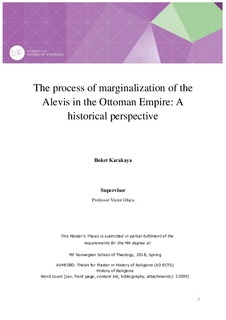| dc.description.abstract | Alevis have been marginalized, massacred, and assimilated since the Ottoman Empire, during the Turkish Republic and continue to be even today. So far, Alevis had to hide their identities and there is no homogenous definition of this identity such as a sect of Islam, Anatolian Shiah or a culture more than a religion. Therefore, the roots of Alevi belief have been under study and the agreed point of objective field researchers is claimed that Alevism is a syncretic belief system. At the same time, the reasons for being the “other” during the Ottoman Empire period have been questioned. The answers appeared in the form of opinions such as the Ottoman Empire tax system and the concomitant poverty, chaos, and rebellions; 16th century Safavid Empire’s propaganda led by Shah Ismail; and the concern related to fundamental religious practices which may damage Islam authority. Another reason, arising from the research, is that Alevism has its own system and heirarchical belief as Alevis conduct their social life based on humanism and equality. Thereby, this belief system and social practices are not compatible with any state government. | nb_NO |
